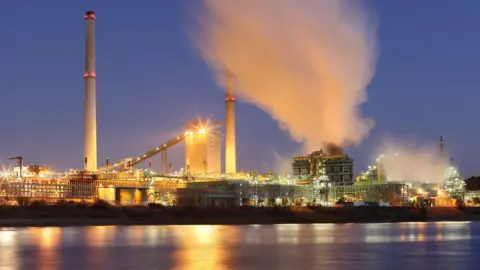Australian government approves first new coal mine since elected
 Getty Images
Getty ImagesThe Australian government has approved a new coal mine for the first time since it was elected - on a climate action platform - last year.
The government was bound by national environment laws when considering Central Queensland's Isaac River coal mine, a spokeswoman said.
Only one coal mine proposal has ever been blocked under those laws.
Scientists have repeatedly warned that any new fossil fuel projects are not compatible with global climate goals.
The Isaac River coal mine - which will be built near Moranbah, an 11-hour drive north of Brisbane - is expected to produce about 2.5 million tonnes of coal over five years.
The mine will extract metallurgical coal, also known as coking coal, which is used in steelmaking.
Although a small mine compared to others in the state, its production could amount to some 7 million tonnes of greenhouse gases in its lifetime, think tank the Australia Institute says.
Environment groups had called on the government to block the new development, on the grounds it would increase global emissions and damage the habitat of endangered or vulnerable species like the koala, the central greater glider and the ornamental snake.
But when Environment Minister Tanya Plibersek's proposed decision was announced on Thursday afternoon, the government said no-one had made submissions during the formal consultation period.
"The Albanese government has to make decisions in accordance with the facts and the national environment law - that's what happens on every project, and that's what's happened here," a spokeswoman for Ms Plibersek said .
The proponents of the mine, Bowen Coking Coal, will have the opportunity to respond to any proposed conditions on the development before it is formally approved - usually in a matter of months.
Since it came to power in May 2022 after campaigning on greater climate action, Anthony Albanese's Labor government has enshrined into law a stronger emissions reduction target - of 43% by 2030 - and has negotiated the introduction of a carbon cap for the country's biggest emitters.
But it has refused to rule out new coal and gas projects.
And while it in February blocked a coal mine on environmental grounds for the first time in history, it did not consider climate in doing so.
The UN's Intergovernmental Panel on Climate Change (IPCC) says any new fossil fuel projects are not compatible with the aim of the Paris Agreement - limiting global warming to 1.5 degrees. In fact, existing fossil fuel infrastructure must be urgently phased out, it says.
Greens environment spokeswoman Sarah Hanson-Young said the decision demonstrated a need for reform.
"Australia's environment laws are clearly broken. Polluting projects are failing to be assessed for the emissions they create," she said.
